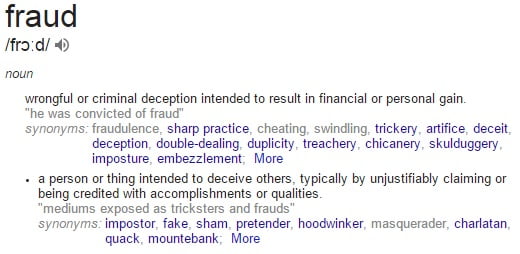Fraudsters want to take what you have worked hard to earn. The scale of fraud will astound you. Not only does it affect individuals, but private, public and charity sectors too. It is estimated that total losses are around £52bn every year! Of this amount £9.1bn is lost by individuals. So, let’s be clear about what fraud is. The Oxford English Dictionary defines it as:

Forms of Fraud against Individuals
The forms of fraud you are likely to be most conscious of are those typically directed against individuals, although it’s clear that at the end of the day we all pick up the tab for fraud committed against government (they have to recover it through taxes) and private sector companies (they recover it through higher prices). So while fraud is a drag on the economy the most painful form of fraud is that which targets you directly:
Major forms of fraud against individuals
| Mass-marketing fraud |
telephone calls, letters, emails, text messages |
£3.5bn |
| Identity fraud/theft |
misuse of personal information |
£3.3bn |
| Online ticket fraud |
bogus websites where tickets never materialise |
£1.5bn |
| Private rental Property fraud |
a type of advanced fee scam against would-be tenants |
£0.8bn |
In general the losses suffered by individuals are proportionately greater than those suffered by government or the private sector. On average 1% of a family’s net income is lost to fraud1 – so a typical UK family with an after-tax income of £30,000 could be losing the equivalent of £300 per year from fraud! Hopefully fraud has never touched you, but it is estimated that in excess of 10% of adults are victims of fraud of one form or another each year! There is a growing risk that you too could become a victim of fraud. It pays to protect yourself as much as you can.
How to Protect Yourself against Fraud
You may not like this but in today’s society it is sensible to remain suspicious and a little distrustful. It’s an old adage, but if any offer made to you seems too good to be true then it probably is.
Top 10 tips from ActionFraud.Police.UK
- Do not provide any personal information to people or organisations until you know for certain who they are. Do extra checks if necessary.
- Do not trust emails from banks or other financial institutions that ask you to click on a link and confirm your bank details, no matter how genuine they look. Banks will never send such emails. If necessary ring your bank to check using a phone number on a genuine piece of correspondence.
- Shred all receipts containing your bank card details.
- Ensure you have up-to-date anti-virus software on your computer, and set your internet browser’s security setting to its highest level.
- Fortify your debit/credit cards by signing up for “Verified by Visa” and “Mastercard Secure Code” when given the option by an online retailer.
- If you receive invoices, bills or receipts for things you haven’t bought or are contacted about outstanding debts assume your identity has been stolen and take action.
- Regularly check your credit file with one or more of the UK’s three credit reference agencies (Equifax, Call Credit & Experian).
- Be suspicious of post, phone calls or emails offering you great opportunities.
- If you have become a fraud victim be wary of people claiming they can help you recover what you have lost.
- If you need further advice about fraud then call Action Fraud
Are you a Victim of Fraud?
If you believe that you have become the victim of fraud or you think you have uncovered a scam then it is important that you report it. Since April 2013 all fraud needs to be reported to Action Fraud. Reporting it will help the authorities to tackle what is a growing menace.

To report fraud:
This infographic from ActionFraud helps to explain how the information you provide is used to combat fraud – we all owe it to each other to do our bit. So, report it.
Summary
The risk of fraud is significant and the potential loss from a scam or fraud can be substantial. But by actively taking precautions you can help to reduce the risk you face every day. If you do suffer from a scam or lose money by any form of fraud don’t shy away from reporting it. By reporting it you can help to gradually stamp it out.
1 National Fraud Authority “Annual Fraud Indicator 2013”
About Solution-Loans.co.uk: we are a no-fee online-only broker dedicated to providing customers with the information and tools to help them identify the personal finance product that is right for them.
Save







